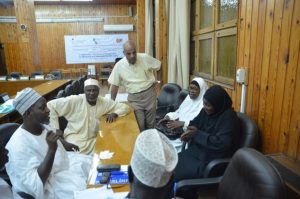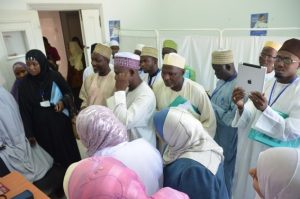
The Grand Challenge Canada (GCC) Saving Lives at Birth Pilot project was designed to address high rate of maternal and neonatal death in Jigawa and Katsina states of Northern Nigeria (NDHS, 2008) from 2011 – 2013. It seeks to improve maternal and neo-natal health in these two states by supporting Religious Opinion Leaders (ROLs) to get involved and communicate clear and correct messages in support of best practices and health seeking decision making at community levels. The objectives of the pilot project were: to reduce numbers and coverage of incorrect and negative public pronouncements against maternal and neonatal health (M&NH) made by 40 influential Islamic Opinion Leaders (ISOLs) in poor conservative communities with dominant Muslim populations in Northern Nigeria and to increase the numbers and coverage of correct and positive public pronouncements in support of maternal and neonatal health made by 40 influential Islamic Opinion Leaders who formally made negative statements in poor conservative communities with dominant Muslim populations in Northern Nigeria.
The dRPC commenced the project with a sensitization workshop titled – Leadership Development for M&NCH. It was a secular event in which participants were taken through the causes and consequences of maternal and neonatal mortality and morbidity in their communities and the wider society. The training was followed by the Islam and M&NNH study tour to Egypt to learn through experimental interactions the positive role ISOLs actually plan creating demand for maternal and neonatal health services. After returning from the study tour, the ISOLs identified and engaged junior scholars or apprentices in all follow-on activities.

Follow up activities were organized after the study tour to Egypt. These, include, community dialogue sessions on maternal and neonatal health and mentoring sessions with scholars from the Alexandria Egypt, the Institute for Training and Research. The dialogue was conducted through Skype internet.
During the process linkages were established between scholars in Egypt and Nigerian ISOLs through video conferencing for discussions and questions and answers within the project sites.
At the end of the project, the evaluation conducted by Department of Community Medicine, Bayero University, Kano revealed that:
- Over the life of the project Islamic scholars and mosques have become important sources of MNCH information in the intervention communities
- Although baseline values were lacking, the end line showed that more than half (50.7%) of the participants in the intervention community received MNCH health information from Imams compared to 37.3% in the control community
Some of the ISOLs made following comments about the projects during the evaluation exercise ‘I didn’t believe in donor funding. I believed there are hidden motives or agenda associated with that. I was very suspicious.’ However, after the trip to Egypt and reading a lot about our health problems, especially as it affects women and children, I now dedicate 60-70% of my preaching to maternal and child health issues’
‘I have confidence in preaching the MNCH issues. I practice what I preach. Initially many scholars don’t talk about MNCH, but now we preach openly and in this community almost all women attend ANC, hospital delivery and immunization’


